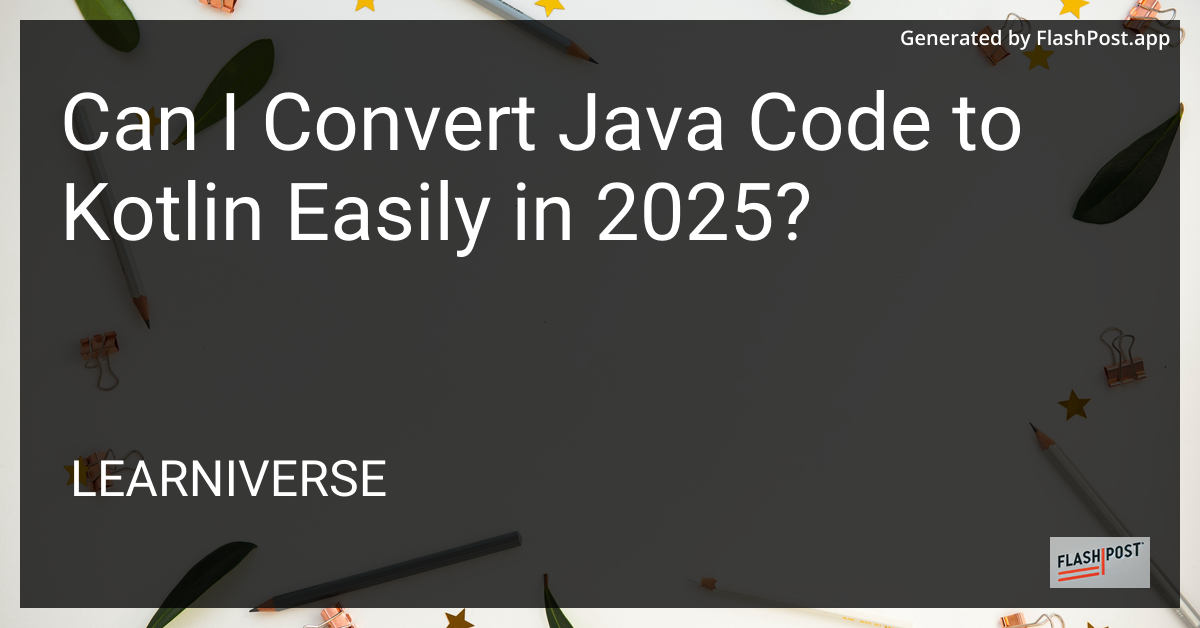Can I Convert Java Code to Kotlin Easily in 2025?

As we approach 2025, Kotlin has firmly established itself as a preferred language over Java for many Android developers. With Kotlin's expressive syntax, extensive libraries, and modern features, it's no wonder developers are eager to convert their legacy Java code bases into Kotlin. But the big question remains: can you convert Java code to Kotlin easily in 2025?
The Evolution of Kotlin Tools
Since Kotlin's introduction, JetBrains has relentlessly worked on improving tools that support the conversion from Java to Kotlin. As of 2025, these tools have matured, offering robust features that simplify the conversion process significantly.
Using the IntelliJ IDEA and Android Studio
The most significant aid in converting Java to Kotlin comes from development environments like IntelliJ IDEA and Android Studio. Both IDEs come equipped with a Kotlin plugin capable of converting Java code to Kotlin code with a simple command.
Here's how you can get started with converting Java to Kotlin in these IDEs:
- Open your Java file in the IDE.
- Navigate to
Code>Convert Java File to Kotlin File. - Review and refine your Kotlin code, ensuring it follows Kotlin best practices.
With these enhanced tools, the conversion process is not only easier but also more reliable, reducing the risk of common errors.
Addressing Potential Challenges
Converting Java code to Kotlin can be straightforward, but certain complexities might arise during the process:
- Lambda Expressions and SAM Conversions: Some Java methods using callbacks might need manual adjustments to leverage Kotlin's lambda syntax or create custom methods for 'by' operator.
- Handling Time and Date: Kotlin encourages using
Instant,LocalDateTime, and others for time operations. Developers may need to realign their time conversion strategies to Kotlin's idiomatic practices, taking into account Kotlin time zone conversions. - JSON Mapping and API Interactions: The way Kotlin handles JSON might differ from Java's practices. It requires attention to correctly map each column of a JSON array in Kotlin.
Best Practices for a Seamless Transition
To ensure a smooth conversion from Java to Kotlin, developers should adhere to these best practices:
Start Small: Choose smaller modules or components for initial conversion. This allows developers to get comfortable with Kotlin syntax and catch any potential issues early.
Regular Testing: Frequent testing throughout the conversion process helps identify bugs and errors quickly, ensuring a seamless transition.
Embrace Kotlin Idioms: Embrace Kotlin's null-safety, extension functions, and other features to write concise and idiomatic code.
Conclusion
In 2025, converting Java code to Kotlin is more straightforward than ever, thanks to advanced tools and robust IDE support. While certain challenges may arise, understanding Kotlin's unique features and potential pitfalls can lead to a smooth and efficient code transition.
With growing community support and comprehensive resources, developers are well-equipped to make this transition successfully and leverage Kotlin's full potential. Whether updating your mobile apps or exploring new Kotlin features, the journey from Java to Kotlin offers immense opportunities for innovation and growth.